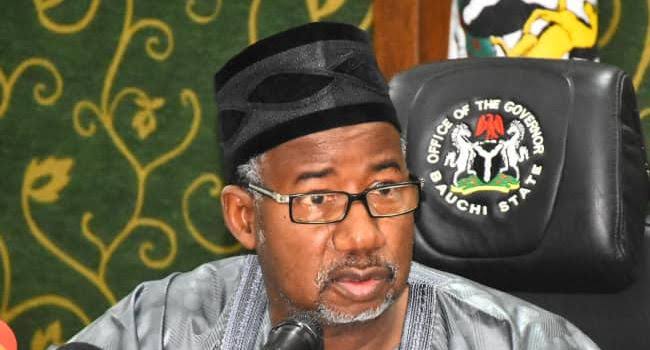In a recent political shake-up aimed at streamlining governance and adjusting to new administrative realities, Bauchi State Governor, Bala Mohammed, has announced the dismissal of Dr. Adamu Sambo from his position as Commissioner for Health. The governor’s decision was made public during the swearing-in ceremony of three new commissioners and the state’s new Chief Security Adviser, a ceremony that also coincided with an executive council meeting.
The removal of Dr. Sambo, who had served diligently in his capacity, was not presented as a result of any misconduct. Rather, it was framed as part of a broader effort by the administration to reposition itself for greater efficiency. Governor Mohammed emphasized the need to reallocate responsibilities and reduce the size of the state’s governmental structure, aligning it with current demands and fiscal realities. The governor expressed appreciation for Dr. Sambo’s contributions to the health sector, assuring that the administration will seek a suitable role for him in the near future, stating, “We had to drop the former Commissioner of Health not because he was found wanting, but because we had to make a leadership decision. We wish him the best and will find a place for him in the government.”
This restructuring was further necessitated by recent changes within the state government’s executive cabinet, most notably the passing of the former Commissioner for Local Government, Ahmed Jalam, who tragically lost his life in a car accident in June 2023. In light of this, Governor Mohammed also revealed a significant administrative change—henceforth, the Ministry of Local Government will no longer have a commissioner assigned to it. This decision is rooted in both the new local government legislation and the Supreme Court judgment regarding local government administration. The governor noted that this move was part of a broader cost-saving measure aimed at reducing the state’s expenditure on governance while implementing a more streamlined and effective administrative structure.
 Governor Mohammed clarified that with the introduction of new local government legislation, and the loss of Commissioner Jalam, it was no longer necessary to fill the vacancy. “Henceforth, we will no longer have a Commissioner for Local Government,” the governor said. This decision reflects the administration’s efforts to adjust to the legal and structural requirements of local government management in Bauchi State, shifting towards a more consolidated governance framework that still ensures adequate representation for all local governments within the state.
Governor Mohammed clarified that with the introduction of new local government legislation, and the loss of Commissioner Jalam, it was no longer necessary to fill the vacancy. “Henceforth, we will no longer have a Commissioner for Local Government,” the governor said. This decision reflects the administration’s efforts to adjust to the legal and structural requirements of local government management in Bauchi State, shifting towards a more consolidated governance framework that still ensures adequate representation for all local governments within the state.
The restructuring wasn’t limited to these changes, as the governor also addressed other cabinet reshuffles. In addition to Dr. Sambo’s removal, two other commissioners voluntarily resigned from their positions to pursue their political aspirations in the upcoming local government elections, particularly as chairmanship candidates. Their departures left vacant positions within the state cabinet that needed immediate filling to ensure continuity in governance.
As part of the reorganization, Governor Mohammed appointed Dr. Sani Dambam as the new Commissioner for Health, tasked with carrying forward the work in the state’s health sector. Dr. Dambam’s appointment comes at a critical time when the state’s health infrastructure continues to face challenges, and his leadership is expected to bring a fresh perspective to the ministry. The governor expressed confidence in Dr. Dambam’s abilities to build upon the foundation laid by his predecessor and to drive meaningful reforms that would enhance healthcare delivery in Bauchi State.
The Ministry of Women Affairs also witnessed a leadership change, with Mrs. Zainab Babbatanka taking over as the new commissioner. Her appointment reflects the administration’s ongoing commitment to empowering women and addressing gender-related issues within the state. Mrs. Babbatanka’s background and experience in gender advocacy are expected to play a pivotal role in advancing the state’s agenda for women’s rights and social inclusion.
In a similar vein, Engineer Mohammed Abdulkadir was assigned to the Ministry of Commerce, where he is expected to revitalize the state’s commercial activities and foster an environment conducive to business growth and investment. His appointment signals a push by the administration to prioritize economic development and to create new opportunities for the citizens of Bauchi State.
Additionally, Dr. Ahmed Abdurrahman has been appointed as the new Chief Security Adviser, a role that is critically important given the current security challenges facing the region. Dr. Abdurrahman’s expertise and understanding of the security landscape are expected to strengthen the state’s approach to addressing crime and improving overall safety. His role will involve close coordination with security agencies to ensure that the state remains proactive in tackling threats and enhancing the protection of lives and property.
During the swearing-in ceremony, Governor Mohammed reiterated his administration’s commitment to inclusive governance, ensuring that every local government area in the state is adequately represented within the cabinet, in line with constitutional provisions. “We are here to fill the vacancies created as a result of the voluntary retirement of three commissioners so that at least every local government will be given parity and representation in the cabinet as required by the constitution,” the governor noted. His statement highlighted the importance of maintaining balanced representation across the state’s various constituencies, especially at a time when political dynamics continue to evolve.
Governor Mohammed’s recent actions, including the cabinet reshuffle and the restructuring of certain ministries, point to a deliberate effort to fine-tune his administration’s operations as it confronts the dual challenges of governance and economic realities. The governor’s approach reflects a commitment to not only reducing the cost of governance but also ensuring that the state remains well-positioned to meet the needs of its citizens through effective leadership and well-thought-out reforms.




